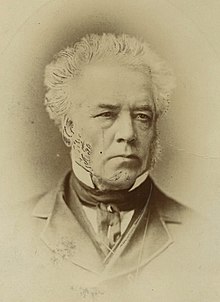Isaac Buchanan | |
|---|---|
 | |
| Member of the Legislative Assembly of the Province of Canada for Toronto | |
| In office 1841–1843 Serving with John Henry Dunn | |
| Preceded by | New position |
| Succeeded by | Henry Sherwood |
| Member of the Legislative Assembly of the Province of Canada for Hamilton | |
| In office 1857–1864 | |
| Preceded by | Allan MacNab |
| Personal details | |
| Born | July 21, 1810 Glasgow, Scotland |
| Died | October 1, 1883 (aged 73) Hamilton, Ontario |
| Political party | Moderate Reformer |
| Spouse | Agnes Jarvie |
| Children | Eleven children |
| Residence | Auchmar |
| Occupation | Landowner, businessman |
| Military service | |
| Allegiance | |
| Branch/service | Upper Canada militia |
| Years of service | 1837–1838 1862–1864 |
| Rank | Lieutenant-Colonel |
| Commands | 13th Battalion Volunteer Militia (Infantry) |
| Battles/wars | Upper Canada Rebellion |
Isaac Buchanan (July 21, 1810 – October 1, 1883) was a businessman, political figure and writer in Upper Canada, then Canada West, Province of Canada (now Ontario). Born in Glasgow, Scotland, he emigrated to British North America in 1830, settling first in Montreal, then York (now Toronto), and then Hamilton. At the height of his business career, he had an extensive house and estate in Hamilton, which he named "Auchmar", in recognition of his Clan Buchanan roots in Scotland.
Buchanan's business was primarily centred in Hamilton and Canada West, but he was an international merchant, with business interests in Scotland and New York as well as Toronto and Montreal. He was the first president of the Hamilton Club, and founder of Hamilton and Toronto boards of trade – forerunners to modern chambers of commerce. He was the founder of the regiment that later became the Royal Hamilton Light Infantry. He was also actively involved in the presbyterian movement in Canada West, helping to establish the Free Church of Scotland in Canada.
Buchanan was elected four times to the Legislative Assembly of the Province of Canada, originally as a moderate Reformer from Toronto, but gradually moving to more conservative opinions, when elected from Hamilton. He was a generous donor to public causes, particularly in the Hamilton area.
Although at one point he was one of the richest men in Canada West, his businesses gradually became unprofitable and failed. He lived in reduced circumstances in his later years, with his income supplemented by a government appointment. He died in Hamilton in 1883.